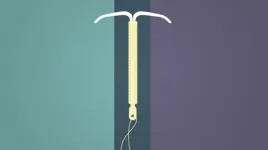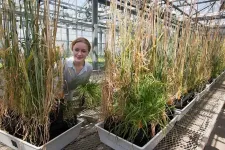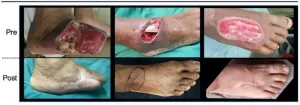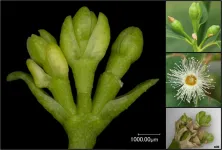(Press-News.org) If relatives of people with mental illness become better at accepting the difficult emotions and life events they experience - which is what training in compassion is about - their anxiety, depression and stress is reduced. These are the results of a new study from the Danish Center for Mindfulness at Aarhus University.
Being a relative of a person with a mental illness can be very burdensome. It can feel like a great responsibility, and many people struggle with feelings of fear, guilt, shame and anger. A new study from the Danish Center for Mindfulness shows that eight weeks of training in compassion can significantly improve the well-being of relatives.
Compassion is a human quality that is anchored in the recognition of and desire to relieve suffering. In other words, compassion occurs when we come into contact with our own or others' suffering and feel motivated to relieve our own or others pain.
"After completing the course, the relatives had increased their well-being on several parameters. They could deal with the illness in a new and more skillful way, and we saw that the training reduced their symptoms of depression, anxiety and stress," says psychologist and PhD student Nanja Holland Hansen, who is behind the study.
And the positive results were maintained after a six month follow-up.
Trying to fix what is difficult
"The relatives learned that the more they turn towards what is difficult, the more skillful they may act. For example, relatives often try to 'fix' the problem or the challenge - so as to relieve their loved ones of what is difficult. That's a huge pressure to constantly deal with, and very few people can bear it," says Nanja Holland Hansen.
Living with chronic fear
She goes on to explain that training in compassion helps people to find the strength and courage to bear pain and suffering when life is difficult. It may seem both sensible and intuitive to guard yourself from the confrontation or avoid what is difficult and unpleasant. But this is the paradox of the training, explains the researcher. Because it is precisely actions and thoughts like these that shut down our compassion and thereby maintain the suffering.
"Fear and grief are emotions that take up a lot space for relatives of people with mental illness. For example chronic fear, which is a real fear that parents of a child with schizophrenia have about whether their child is going to commit suicide, or whether a child with autism will ever enjoy a 'normal life'," explains Nanja Holland Hansen and continues:
"Our suffering is maintained inside of us when we don't work with it. To avoid feeling pain, we may resort to behaviour such as working too much or buying things that we don't need. It's therefore in all these everyday actions that our compassion training becomes important and can be used to help alleviate what is difficult," she says.
No one escapes
The purpose of training in compassion is thus more than just feeling empathy or worrying about another person.
"Not a single person can completely avoid experiencing painful things in their life. In this way we're all the same. But what isn't the same for everyone is our ability to deal with the pain and suffering we experience. Training programmes in compassion have been developed because the research shows that we can train and strengthen our mental health. With systematic training of compassion, we generate more attention - and understanding of - our own thoughts, feelings and behaviour. And this helps us to develop the tools and skills to engage in healthier relations with ourselves and others," she explains.
A total of 161 relatives of people with mental illness participated in the study. This makes the study one of the largest of its kind in the world, and also the first scientific randomised clinical trial carried out with relatives in Denmark. The relatives were between 18 and 75 of age and were family members to people with various psychiatric disorders such as e.g. ADHD, schizophrenia and depression.
Meditation as homework
The relatives met once a week in groups of twenty participants over an eight-week period. Each session lasted two hours and was structured with small group exercises, large group discussions, instruction in the theme of the week and meditation. The homework consisted of twenty minutes of daily meditation.
"There is definitely a shortage of offers for these relatives. They're often told that they should remember to take care of themselves, but they haven't learned how to. We found that those who were involved in the study received the tools for precisely this," says Nanja Holland Hansen.
The results have just been published in the scientific journal JAMA.
"My hope is that local authorities and regions can offer this type of intervention for relatives. It should be an option and could easily be incorporated into our healthcare system. Economically and socially, a healthy person going on sick leave solely because he or she is a relative is a huge loss," says the researcher.
[Billedtekst:]: "Up to fifty percent of relatives of people with mental illness risk becoming ill themselves. That's why it's important that we also keep them and their well-being in mind," says Nanja Holland Hansen.
INFORMATION:
Background for the results
The study is a randomised clinical trial. The test subjects/participants had fifty percent probability of being allocated to either the intervention group or the control group. The allocation was based on a computer algorithm.
The study is financed by the Danish Center for Mindfulness and Aarhus University.
The scientific article can be read in JAMA.
Contact
Psychologist, Research Assistant & PHD student Nanja Holland Hansen
Aarhus University, Department of Clinical Medicine and
The Danish Center for Mindfulness
Mobile: (+45) 2213 1805
Email: nanjahh@clin.au.dk
Centre Director, Associate Professor & PhD Supervisor Lone Fjorback
Aarhus University, Department of Clinical Medicine and
The Danish Center for Mindfulness
Mobile: (+45) 9352 1996
Email: lone.overby.fjorback@clin.au.dk
Tsukuba, Japan - Dermatomyositis is an idiopathic inflammatory myopathy that has been regarded as an autoimmunity-based disorder, although its pathogenesis remains unclear. In this study, researchers from the University of Tsukuba used a mouse model to identify a mechanism by which dermatomyositis may develop in humans. The animal model and findings can be used to better understand the disease and develop disease-specific treatments.
Dermatomyositis belongs to a group of idiopathic inflammatory myopathies that are associated with the presence of specific autoantibodies in patient sera. Multiple myositis-specific autoantibodies, which target proteins ubiquitously expressed in the nucleus or cytoplasm, have been described. One ...
A team of scientists led by Nanyang Technological University, Singapore (NTU Singapore) has created a reusable, biodegradable sponge that can readily soak up oil and other organic solvents from contaminated water sources, making it a promising alternative for tackling marine oil spills.
Made of sunflower pollen, the sponge is hydrophobic - it repels water - thanks to a coat of natural fatty acid on the sponge. In lab experiments, the scientists showed the sponge's ability to absorb oil contaminants of various densities, such as gasoline and motor oil, ...
Astronomers have found two close pairs of quasars in the distant Universe. Follow-up observations with Gemini North spectroscopically resolved one of the distant quasar pairs, after their discovery with the Hubble Space Telescope and Gaia spacecraft. These quasars are closer together than any pair of quasars found so far away, providing strong evidence for the existence of supermassive black hole pairs as well as crucial insight into galaxy mergers in the early Universe.
The quasars in each of the two pairs are separated by just over 10,000 light-years, suggesting ...
Getting a birth control implant used to cost some women hundreds of dollars, if they were among the nearly half of privately insured Americans covered by a health plan with a high deductible that they were responsible for paying.
But a new study in the April issue of Health Affairs shows that after the Affordable Care Act's no-cost birth control provision took effect in 2013, women in these high-deductible health plans (HDHPs) opted for long-acting contraception even more than women with other types of health plans.
The study's findings have important policy implications, because employers now have the ability to opt out of the birth control portion of the ACA, following a Supreme Court case decided in 2020. Many employers have shifted to HDHPs to hold down their overall health ...
Stem rust is a devastating disease of cereal crops, including barley, one of the first domesticated crops in agriculture and the fourth most widely grown crop in the world. Barley is unique because it is one of only a few crops that can be cultivated in almost any climate and across a range of elevations, making it economically and nutritionally important.
Stem rust is one of the biggest threats to barley production and capable of causing complete crop loss during severe epidemics. And since barley is also used as malt for beer and spirits and feed for animals ...
Thirty years ago, clinical psychiatrist Jonathan Shay drew attention to similarities between the trauma experienced by the Greek warriors, as documented in the epic poem "The Iliad," and Vietnam veterans in America. Could the experience of war impact people in similar ways in vastly different cultural milieus?
Research published this week by ASU researcher Sarah Mathew and former ASU postdoctoral researcher Matthew Zefferman in the Proceedings of the National Academy of Sciences shows that Turkana pastoralist warriors from Kenya also experience PTSD (post-traumatic stress disorder) symptoms, even though their lifestyles and combat experiences are ...
Direct human alterations to natural aquatic ecosystems can increase methane emissions, a new study has found.
Atmospheric methane has tripled since pre-industrial times. It traps heat far more effectively than carbon dioxide and accounts for 25% of atmospheric warming to date. And much of that methane is coming from aquatic ecosystems, with human activities contributing to the emissions levels, a new paper published in Nature Geoscience has found.
The global contribution and importance of aquatic ecosystems as methane emitters has been underestimated, ...
Anyone who has visited the Australian outback would be familiar with spinifex grasses, which cover almost a fifth of our continent.
Like many scientists, they may have also wondered why this iconic arid grass grows in striking ring shapes.
Previous studies have tested whether spinifex rings could be caused by termites, water availability or nutrient depletion, but none has provided a convincing explanation.
Now scientists from UNSW Sydney have found that pathogenic soil microbes play a role in how the spinifex got its hole.
Their study, the first of its kind in an arid ecosystem, has been published in the Australian Journal of Botany.
Professor Angela Moles and Neil Ross from ...
Durham, NC - According to the results of a phase 1 clinical trial just published in STEM CELLS Translational Medicine, a new stem cell therapy shows promise of making diabetes-related amputations a thing of the past. The trial involved injecting diabetes patients suffering from non-healing diabetic foot ulcers (DFU) with a cell preparation containing adult stem cells harvested from their own fat. The results showed that the treatment induced regeneration of the blood vessels surrounding the DFUs, accelerated healing - all with no serious side effects.
"Non-healing diabetic foot ulcers usually ...
CORVALLIS, Ore. - Eucalyptus, a pest-resistant evergreen valued for its hardy lumber and wellness-promoting oil, can be genetically modified not to reproduce sexually, a key step toward preventing the global tree plantation staple from invading native ecosystems.
Oregon State University's Steve Strauss led an international collaboration that showed the CRISPR Cas9 gene editing technique could be used with nearly 100% efficiency to knock out LEAFY, the master gene behind flower formation.
"The flowers never developed to the point where ovules, pollen or ...




